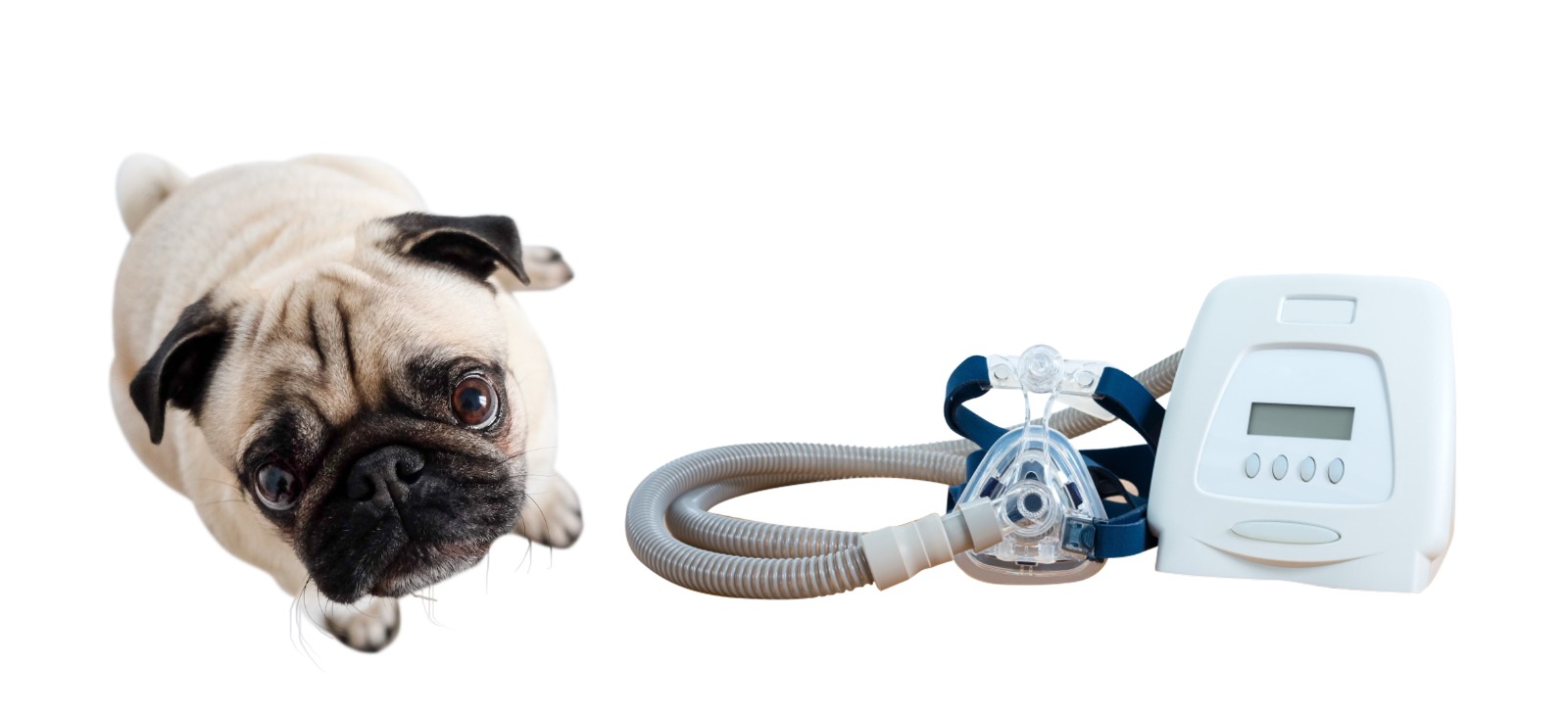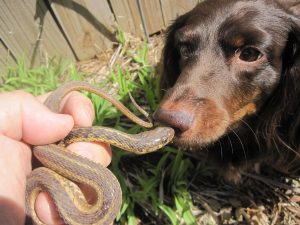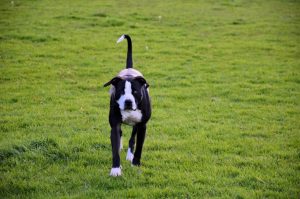If you are reading this article it is more likely that your dog is suffering from sleep apnea and you are trying to find if there is a sleep apnea machine or CPAP machine for dogs available. Well, that’s quite unfortunate to see your dog in such a state in which they temporarily stop breathing or feel difficulty in breathing normally due to various reasons. Unfortunately, there are no CPAP machines for dogs just like there are similar machines for humans.
Dogs cannot use CPAP machines in the same way as humans. CPAP machines are specifically designed to provide a constant flow of pressurized air to help individuals with sleep apnea or other respiratory conditions maintain open airways during sleep.
Actually, dogs do not suffer from sleep apnea in the same manner as humans, and their respiratory needs are different. If you suspect that your dog has any respiratory issues or breathing difficulties during sleep, it is essential to consult with a veterinarian. They can properly assess your dog’s health and recommend appropriate treatments or solutions based on their specific condition. Do not attempt to use a CPAP machine intended for humans on a dog, as it can be potentially harmful and is not suitable for their needs.
Read Is a Bernedoodle Suitable for me?
Let’s find out more about sleep apnea in dogs and CPAP machines below.
Table of Contents
What is a CPAP Machine?
A CPAP (Continuous Positive Airway Pressure) machine is a medical device used primarily to treat sleep apnea, a sleep disorder characterized by pauses or interruptions in breathing during sleep. The CPAP machine delivers a constant flow of pressurized air through a mask worn over the nose or both the nose and mouth. The continuous air pressure helps keep the airway open and prevents it from collapsing during sleep, ensuring a steady and uninterrupted flow of oxygen to the lungs.
CPAP therapy is the most common and effective treatment for obstructive sleep apnea (OSA), the most prevalent type of sleep apnea. By maintaining an open airway, the CPAP machine reduces snoring, prevents apneic events, and improves the overall quality of sleep for individuals with sleep apnea.
CPAP machines come in various models, including fixed-pressure, auto-adjusting, and BiPAP (Bi-level Positive Airway Pressure) machines, each designed to suit different patient needs. Additionally, there are various types of masks available to cater to individual preferences and comfort levels.
CPAP Machines are not suitable for dogs so it is better to talk to your vet if your dog has sleep apnea.
Why CPAP Machines are not suitable for dogs?
CPAP machines are specifically designed for use on humans and are not suitable for use on dogs. The reasons why CPAP machines cannot be used on dogs are as follows:
Different Anatomy:
Dogs have a different anatomical structure than humans, including differences in the size and shape of their airways, respiratory system, and facial features. CPAP machines are specifically designed to fit human faces and deliver air pressure to human airways, and using them on dogs would not be compatible or effective.
Different Respiratory Needs:
Dogs do not suffer from sleep apnea in the same way as humans do. Sleep apnea in dogs is generally caused by different factors than those affecting humans, such as anatomical abnormalities or neurological issues that lead to breathing difficulties during sleep. Therefore, the treatment approaches for sleep apnea in dogs differ from those used in humans.
Animal-Specific Treatment:
When dogs experience respiratory issues during sleep, they require a veterinarian’s assessment and treatment. Vets can diagnose the underlying cause of the sleep apnea and recommend appropriate treatment options, which may include lifestyle changes, medications, or other veterinary-specific interventions.
Safety Concerns:
Using a CPAP machine intended for humans on a dog could be potentially harmful and unsafe. The pressure levels and delivery mechanisms of CPAP machines are calibrated for human use, and applying them to a dog’s respiratory system could result in complications or adverse effects.
To ensure the health and well-being of dogs with respiratory issues during sleep, it is essential to seek proper veterinary care and follow the advice of qualified professionals who can provide appropriate and safe treatment options.
What is sleep apnea?
Sleep apnea in dogs is a sleep disorder characterized by pauses or interruptions in breathing during sleep. Similar to humans, these pauses can be caused by an obstruction in the airway or by a neurological issue affecting the dog’s ability to breathe properly during sleep.
The most common type of sleep apnea in dogs is obstructive sleep apnea (OSA) which is often associated with physical obstructions such as enlarged tonsils, elongated soft palate, or other anatomical abnormalities that block the airway. Brachycephalic dog breeds (with short, flat faces) such as French Bulldogs or Pugs are more prone to developing OSA due to their unique facial structure.
Central sleep apnea is another type of sleep disorder that can affect dogs. It occurs when the brain fails to send the appropriate signals to control breathing during sleep.
Symptoms of sleep apnea in dogs may include loud snoring, gasping or choking sounds during sleep, restless sleep patterns, fatigue during the day, and difficulty breathing. It’s essential for pet owners to be aware of these signs and seek veterinary attention if they suspect their dog may have sleep apnea.
Diagnosing sleep apnea in dogs typically involves a thorough physical examination, as well as imaging tests or sleep studies. Treatment options may vary depending on the cause and severity of the condition, but they can include weight management (for overweight dogs), medications, or in some cases, surgical interventions to address airway obstructions.
As with any medical concern, it’s crucial for pet owners to consult a veterinarian for proper evaluation and guidance regarding the best course of action for their dog’s specific situation.
Can a dog die from sleep apnea?
Yes, in severe cases, sleep apnea can lead to serious health issues and even death. If a dog’s sleep apnea is left untreated, it can put additional strain on their heart and other organs due to reduced oxygen supply, leading to potential complications such as heart problems, hypertension, and other related issues.
So, it is always recommended to see your vet if you suspect your dog has developed sleep apnea or a similar condition.
What are CPAP Machine Alternatives or Treatments for Dogs?
The treatment for sleep apnea in dogs depends on the underlying cause of the condition. It is very important to work closely with a specialist vet to diagnose the root cause and develop an appropriate treatment plan.
Here are some general approaches that may be used to treat sleep apnea in your fur baby:
- Weight Management – If the dog is overweight, weight loss may be recommended as excess weight can contribute to airway obstruction, especially in brachycephalic breeds.
- Surgical Intervention – In cases where anatomical abnormalities are causing sleep apnea, surgical procedures may be considered to take care of these issues. For example, surgeries such as soft palate resection or stenotic nares correction can help improve the dog’s breathing.
- Medications – Depending on the underlying cause of sleep apnea, certain medications may be prescribed to address respiratory issues or related health conditions.
- Positional Therapy – Adjusting the dog’s sleeping position may help improve breathing. Elevating the dog’s head during sleep or encouraging side sleeping may be beneficial.
- Lifestyle Changes – If certain factors, such as allergens or irritants, contribute to sleep apnea in the dog, making lifestyle changes to eliminate or minimize exposure to these triggers can be helpful.
It is crucial to follow the veterinarian’s recommendations closely and monitor the dog’s progress during treatment. Additionally, pet owners should ensure that their dog has a safe and comfortable sleeping environment that supports their respiratory health.
Conclusion:
So, it is certain that there are no sleep apnea machines or CPAP machines for dogs. It is also certain that you are not supposed to use the regular CPAP machines for dogs because these machines are specifically designed for humans and using them to treat sleep apnea in your dogs could be deadly. Instead, visit your veterinarian as soon as possible and get your dog treated.
Recommended read – Most Popular Corgi Names










